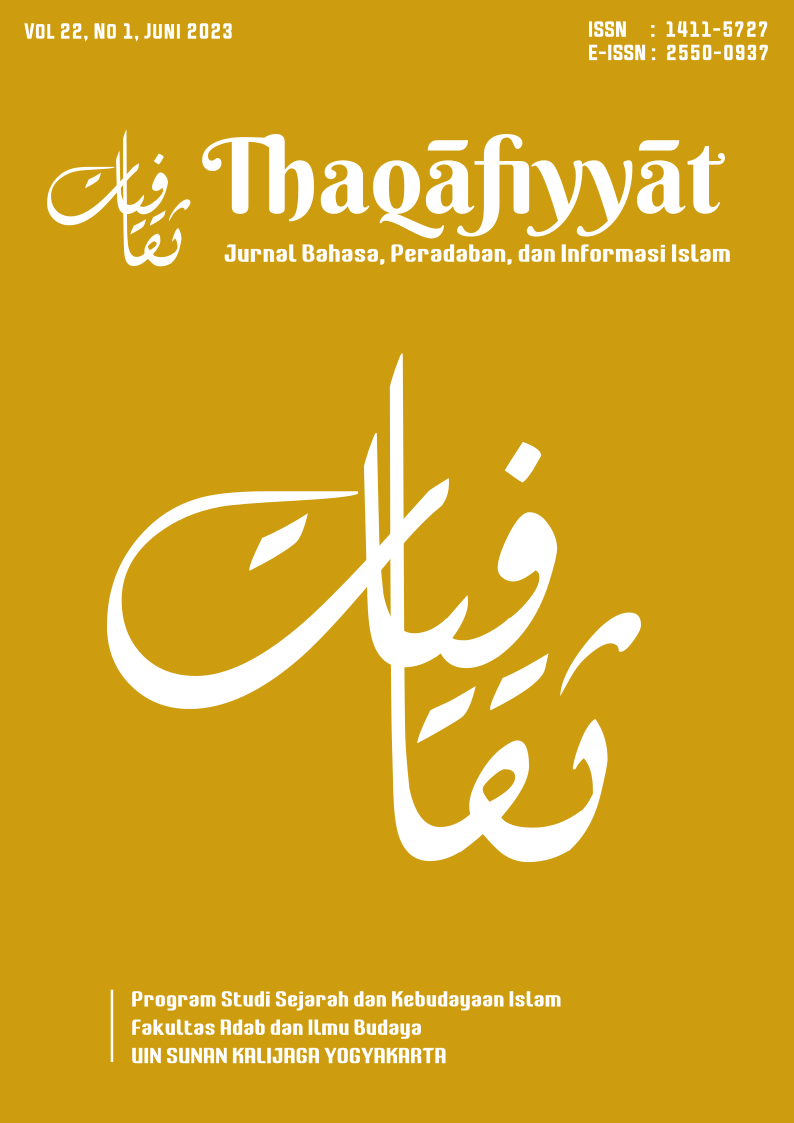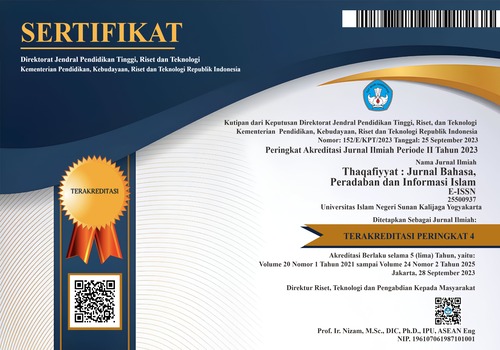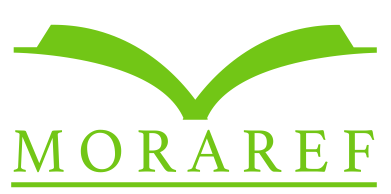Nilai Moderasi Beragama Dalam Ajaran Himpunan Penghayat Kepercayaan Masade’ Di Kepulauan Sangihe
DOI:
https://doi.org/10.14421/thaq.2022.22101Kata Kunci:
Kepercayaan lokal, Islam Masade, Kepulauan SangiheAbstrak
Abstract: Religious problems in Indonesia are not only limited to major religions but also involve cases at the micro level, such as what happened to the adherents of Masade Islam in the Sangihe Islands. The author focuses on the process of the emergence of Masade Islam in the border area of the Sangihe Islands, the factors that influence its formation, and the application of religious moderation values by Masade Islam adherents. To answer these problems, the author uses a socio-cultural approach as an analytical tool. This research uses the concept of monotheistic religion and the concept of supernatural power understood based on the theory of religious evolution. This research uses historical research methods that include heuristics, criticism, interpretation, and historiography. The researcher argues that the influence and dominance of religious beliefs in the Masade' Trust developed along with the competition for power and politics in the Sangihe Islands. The dialectic between religion and culture is strong evidence of this influence. The discovery of historical facts that shaped the beliefs of the community known as Masade' reinforces the close relationship between Islam influenced by local culture (local wisdom) as evidenced through the process of rituals and worship performed in the local belief. Although the adherents of masade Islam recognize them as Muslims, the practice of worship is different. This shows that masade Islam is not part of Islam but a religion of belief that has noble local cultural values which also become the axis of their enthusiasm in carrying out a tolerant life in the frame of religious moderation.
Abstrak: Permasalahan keberagamaan di Indonesia tidak hanya terbatas pada agama-agama besar, melainkan juga melibatkan kasus-kasus pada tingkat mikro, seperti yang terjadi pada penganut agama kepercayaan Islam Masade di kepulauan Sangihe. Penulis memfokuskan perhatian pada proses munculnya ajaran Islam Masade di kawasan perbatasan Kepulauan Sangihe, faktor-faktor yang mempengaruhi pembentukannya, serta penerapan nilai-nilai moderasi beragama oleh para penganut Islam Masade. Untuk menjawab permasalahan tersebut, penulis menggunakan pendekatan sosio-budaya sebagai alat analisis. Penelitian ini menggunakan konsep agama monoteistik dan konsep kekuasaan supernatural yang dipahami berdasarkan teori evolusi agama. Penelitian ini menggunakan metode penelitian sejarah yang meliputi heuristik, kritik, interpretasi, dan historiografi. Peneliti berargumen bahwa pengaruh dan dominasi keyakinan agama dalam Kepercayaan Masade’ berkembang seiring dengan persaingan kekuasaan dan politik di Kepuluan Sangihe. Dialektika antara agama dan budaya menjadi bukti yang kuat atas pengaruh tersebut. Penemuan fakta sejarah yang membentuk kepercayaan masyarakat yang dikenal sebagai Masade menguatkan hubungan yang erat antara Islam yang dipengaruhi budaya lokal (lokal wisdom) yang dibuktikan melalui proses ritual dan ibadah yang dilakukan dalam kepercayaan lokal tersebut. Meskipun penganut Islam masade mengakui mereka sebagai pemeluk Islam, tetapi dalam praktik ibadahnya berbeda. Hal ini menunjukkan Islam masade bukan bagian dari Islam tetapi menjadi agama kepercayaan yang mempunyai nilai-nilai budaya lokal yang luhur yang juga menjadi poros semangat mereka dalam menjalankan kehidupan yang toleran dalam bingkai moderasi beragama.
Unduhan
Referensi
Abdurrahman, Dudung. Metodologi Penelitian Sejarah Islam. Edited by Turatea Kreatif. Yogyakarta: Penerbit Ombak, 2011.
Ariel C Lopez. “Conversion and Colonialism Islam and Christianity in North Sulawesi, c. 1700-1900. Leiden: Universiteit Leiden, 2018.
Armando Cartesao. The Suma Oriental of Tome Pires Volume 1. Vol. 1. London: Hakluyt Society, 1944.
Brilman, D., Wuaten, L., & Badan Pekerja Sinode Gereja Masehi Injili Sangihe Talaud. Kabar Baik Di Bibir Pasifik: Zending Di Kepulauan Sangihe Dan Talaud. Jakarta: Pustaka Sinar Harapan, 2000.
Chris Jenks. Culture: Studi Kebudayaan. 2nd ed. Yogyakarta: Pustaka Pelajar, 2013.
Department of Public Works. Harbour Works: Netherlands East Indian Works, Batavia, 1920.
Ferrand, Gabriel. Relations de Voyages et Textes Géographiques Arabes, Persans et Turks Relatifs a l’Extrême-Orient Du VIIIe Au XVIIIe Siècles. Vol. 1–2. Cambridge University Press, 2015.
Hasan, Mustaqim. PRINSIP MODERASI BERAGAMA DALAM KEHIDUPAN BERBANGSA, n.d. https://journal.an-nur.ac.id/index.php/mubtadii.
Henley, David. “From Low to High Fertility in Sulawesi (Indonesia) during the Colonial Period: Explaining the ‘First Fertility Transition.’” Population Studies 60, no. 3 (November 2006): 309–327.
Hordern, Joshua. “Religion and Culture.” Medicine 44, no. 10 (October 2016): 589–592.
Ichsan Azis, Muhammad N., Muhammad Amir, Muh Subair, Syamsurijal Syamsurijal, Abdul Asis, and Muhammad I. Syuhudi. “Religion and Identity Polarisation: A Slight Notfrom the Frontier Region.” HTS Teologiese Studies / Theological Studies 79, no. 1 (2023).
Ichsan Azis, Muhammad Nur. “ISLAMISASI DI KAWASAN LAUT SULAWESI PADA ABAD KE-19.” JURNAL PENELITIAN SEJARAH DAN BUDAYA 5, no. 1 (July 13, 2019): 1–22.
Ives, Christopher D., and Jeremy Kidwell. “Religion and Social Values for Sustainability.” Sustainability Science 14, no. 5 (September 19, 2019): 1355–1362.
Kuntowijoyo. Pengantar Ilmu Sejarah . Yogyakarta: Bentang Budaya, 2001.
Lapian, Adrian B. “Laut Sulawesi: The Celebes Sea, from Center to Peripheries.” Moussons, no. 7 (September 1, 2004): 3–16.
Louis, Vivian, Sandy Nur, and Ikfal Raharjo. Indonesia’s Delimited Maritime Boundaries. Heidelberg: Springer. Xvii + 266 Hlm, 2014.
Madjid, Nurcholish. “Islam Agama Kemanusiaan: Membangun Tradisi Dan Visi Baru Islam Indonesia” (1995): 5.
Majul, Cesar Adib. “An Analysis of the ‘Genealogy of Sulu.’” Archipel 22, no. 1 (1981): 167–182.
Muh. Nur Ichsan A. Sejarah Islam Di Perbatasan : Islam Masade’ Di Kepulauan Sangir, n.d.
Non, Domingo M. Moro Piracy during the Spanish Period and Its Impact. Southeast Asian Studies. Vol. 30, 1993.
Patur, Oleh :, Rahman Lahindah, Albert W S Kusen, and Nasrun Sandiah. ISLAM MASADE DI DESA LENGANENG KECAMATAN TABUKAN UTARA KABUPATEN KEPULAUAN SANGIHE, n.d.
Peter Bellwood. Prasejarah Kepulauan Indo-Malaysia: Edisi Revisi. Jakarta: PT. Gramedia Pustaka Utama, 2000.
Pristiwanto, Pristiwanto. “Dinamika Pisang (Filipina-Sangihe) Di Perbatasan Indonesia-Filipina.” Antropologi Indonesia 37, no. 1 (December 13, 2017).
Rubaidi, dkk, Moderasi Beragama Berbasis Potensi, Aset, dan Budaya Masyarakat Lokal (Sidoarjo: Kanzun Books, 2020).
Salmin Djakaria. Kisah Gumansalangi Alias Medellu : Tradisi Lisan Melintas-Batas Di Kabupaten Kepulauan Sangihe. Yogyakarta: Amara Books, 2016.
Sidi Gazalba. Agama Dan Masyarakat. Yogyakarta: Pustaka Fahima, 2005.
Tim Penyusun Kementerian Agama RI, Moderasi Beragama (Jakarta: Badan Litbang dan Diklat Kementerian Agama RI, 2019).
Tirtosudarmo, Riwanto. “Kalimantan Barat Sebagai ‘Daerah Perbatasan’: Sebuah Tinjauan Demografi-Politik.” Antropologi Indonesia 0, no. 67 (July 22, 2014).
Ulaen, Alex John, Koordinator Peneliti, Pusat Kajian, Komunitas Adat, Budaya Bahari, Yayasan Marin-Crc, Manado Pengajar Pada Fakultas, Ilmu Budaya, Universitas Sam, and Ratulangi Manado. LAUT YANG MENYATUKAN: MENGUNGKAP RUANG-JEJARING LAUT NUSANTARA. Journal of Cultural Sciences. Vol. 12, 2017. http://journal.unhas.ac.id/index.php/jlb.
Walandungo, and Don Javirius. Islam Tua: Terpasung Dan Merana. Salatiga: Universitas Kristen Satya Wacana, 2002.
Yusrul, Muhamad, Hana Sekolah Tinggi, Ilmu Budaya, Islam Syekh, and Jangkung Pati. “Al Izzah: Jurnal Hasil-Hasil Penelitian Perubahan Sosial Masyarakat Di Jazirah Arab: Transformasi Kultural Ashabiyah Dalam Menunjang Kekuasaan Nabi Muhammad” 15, no. 2 (2020).
Unduhan
Diterbitkan
Terbitan
Bagian
Lisensi
Hak Cipta (c) 2024 Muhamad Yusrul Hana

Artikel ini berlisensiCreative Commons Attribution-NonCommercial-ShareAlike 4.0 International License.
Authors who will publish with this journal agree to the following terms:
- Thaqafiyyat: Jurnal Bahasa, Peradaban dan Informasi Islam publishes all articles entirely in full text.
- It is permissible for readers to download and to use it for scientific purposes and scientific dissemination.
- Authors retain copyright and grant the journal right of first publication with the work simultaneously licensed under a Creative Commons Attribution License that allows others to share the work with an acknowledgement of the work's authorship and initial publication in this journal.
- Authors are able to enter into separate, additional contractual arrangements for the non-exclusive distribution of the journal's published version of the work (e.g., post it to an institutional repository or publish it in a book), with an acknowledgement of its initial publication in this journal.
- Authors are permitted and encouraged to post their work online (e.g., in institutional repositories or on their website) prior to and during the submission process, as it can lead to productive exchanges, as well as earlier and greater citation of published work.









